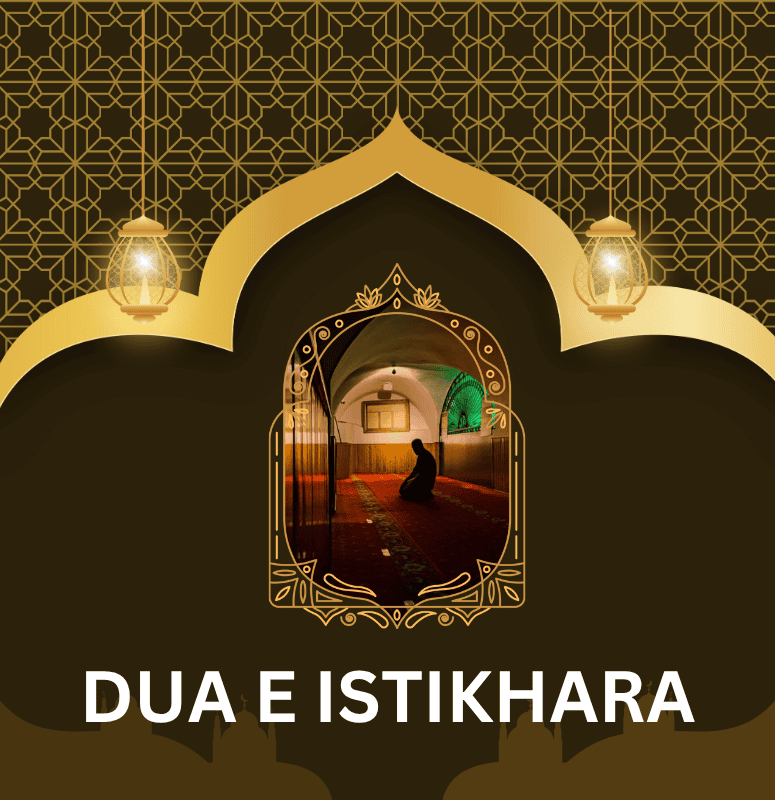Introduction to Dua e Istikhara short
In Islam, making decisions can be a profound act of faith, especially when faced with choices that impact one’s life, faith, or future. Dua e Istikhara, or the prayer for seeking guidance, is a Sunnah practice taught by Prophet Muhammad (peace be upon him) to help Muslims seek Allah’s counsel in matters of uncertainty. The term “Istikhara” comes from the Arabic word “khayr,” meaning goodness, and it reflects the act of asking Allah to guide one toward what is best in both this world and the hereafter.
This blog provides a detailed guide on Dua e Istikhara, including its significance, how to perform it, a short version of the dua, online Istikhara services, and its relevance in regions like the UK. We’ll also address common questions in an FAQ section and provide structured data for better online visibility.

What is Dua e Istikhara?
Istikhara is a prayer performed when a Muslim faces a decision—big or small—and seeks divine guidance to choose the path that aligns with Allah’s wisdom. It involves offering two non-obligatory rak’ahs (units of prayer) followed by a specific supplication, known as Dua e Istikhara. The dua asks Allah, the All-Knowing, to guide the supplicant toward what is best for their religion, livelihood, and ultimate outcome.
The Prophet Muhammad (peace be upon him) emphasized its importance, teaching it to his companions as he taught them Quranic surahs. According to a hadith in Sahih al-Bukhari, he said, “If anyone of you thinks of doing any job, he should offer a two rak’at prayer other than the compulsory ones and say [the Istikhara dua].” This practice underscores the believer’s reliance on Allah’s infinite knowledge.
Dua e Istikhara Short
While the full Dua e Istikhara is comprehensive, some seek a shorter version for ease of memorization. However, it’s important to note that the authentic dua, as taught by the Prophet (peace be upon him), is the most recommended. A shortened version circulating from a Daif (weak) hadith is not advised, as it lacks the same authenticity. Below is the authentic dua in Arabic, with transliteration and translation for accessibility.
Dua e Istikhara (Arabic)
اللَّهُمَّ إِنِّي أَسْتَخِيرُكَ بِعِلْمِكَ، وَأَسْتَقْدِرُكَ بِقُدْرَتِكَ، وَأَسْأَلُكَ مِنْ فَضْلِكَ الْعَظِيمِ، فَإِنَّكَ تَقْدِرُ وَلَا أَقْدِرُ، وَتَعْلَمُ وَلَا أَعْلَمُ، وَأَنْتَ عَلَّامُ الْغُيُوبِ، اللَّهُمَّ إِنْ كُنْتَ تَعْلَمُ أَنَّ هَذَا الْأَمْرَ خَيْرٌ لِي فِي دِينِي وَمَعَاشِي وَعَاقِبَةِ أَمْرِي، فَاقْدُرْهُ لِي وَيَسِّرْهُ لِي ثُمَّ بَارِكْ لِي فِيهِ، وَإِنْ كُنْتَ تَعْلَمُ أَنَّ هَذَا الْأَمْرَ شَرٌّ لِي فِي دِينِي وَمَعَاشِي وَعَاقِبَةِ أَمْرِي، فَاصْرِفْهُ عَنِّي وَاصْرِفْنِي عَنْهُ وَاقْدُرْ لِي الْخَيْرَ حَيْثُ كَانَ ثُمَّ أَرْضِنِي بِهِ
Transliteration
Allahumma inni astakhiruka bi’ilmika, wa astaqdiruka biqudratika, wa as’aluka min fadlika al-azim. Fa’innaka taqdiru wa la aqdiru, wa ta’lamu wa la a’lamu, wa anta ‘allamul ghuyub. Allahumma in kunta ta’lamu anna hadha al-amra khayrun li fi dini wa ma’ashi wa ‘aqibati amri, faqdurhu li wa yassirhu li thumma barik li fihi. Wa in kunta ta’lamu anna hadha al-amra sharrun li fi dini wa ma’ashi wa ‘aqibati amri, fasrifhu ‘anni wasrifni ‘anhu, waqdur li al-khayra haythu kana thumma ardini bihi.
Translation
“O Allah, I seek Your guidance by Your knowledge, and I seek ability by Your power, and I ask You of Your great bounty. You have power, I have none. And You know, I know not. You are the Knower of hidden things. O Allah, if in Your knowledge, this matter is good for my religion, my livelihood, and my affairs, then ordain it for me, make it easy for me, and bless me in it. And if in Your knowledge, this matter is bad for my religion, my livelihood, and my affairs, then turn it away from me, and turn me away from it, and ordain for me the good wherever it may be and make me pleased with it.”
When reciting, mention the specific matter (e.g., marriage, job) at “hadha al-amra” (this matter) either mentally or verbally.
How to Perform Istikhara Prayer
Performing Salat al-Istikhara is straightforward yet requires sincerity and focus. Here’s a step-by-step guide:
Perform Wudu (Ablution): Ensure you are in a state of ritual purity.
Intention (Niyyah): Make the intention to perform two rak’ahs of non-obligatory prayer for Istikhara.
Pray Two Rak’ahs:
In the first rak’ah, recite Surah Al-Fatiha followed by Surah Al-Kafirun (Chapter 109).
In the second rak’ah, recite Surah Al-Fatiha followed by Surah Al-Ikhlas (Chapter 112).
Recite Dua e Istikhara: After completing the prayer with salam, recite the Istikhara dua with full concentration, mentioning the specific decision.
Trust Allah’s Guidance: Reflect on your feelings, circumstances, or signs post-prayer. Guidance may come as a sense of peace, ease in the matter, or obstacles indicating otherwise.
It’s recommended to recite salutations (durood) on the Prophet (peace be upon him) before and after the dua and to sleep facing the Qibla in a state of wudu, though sleeping is not mandatory.
Signs and Outcomes of Istikhara
Istikhara is not about expecting dreams or visions, though they may occur. Guidance often manifests as:
A sense of peace or inclination toward a decision.
Ease or obstacles in pursuing the matter.
Changes in circumstances, such as new opportunities or roadblocks.
If clarity is not achieved, scholars recommend repeating Istikhara up to seven times, typically on separate occasions. Patience and trust in Allah’s wisdom are crucial.
Online Istikhara Services
In today’s digital age, online Istikhara services have gained popularity, especially in regions like the UK, where Muslims may seek guidance from scholars remotely. These services involve consulting qualified Islamic scholars or experts who guide individuals through the process or perform Istikhara on their behalf. However, Istikhara is a personal prayer, and delegating it entirely is not recommended. Instead, online platforms can:
Provide dua texts in Arabic, transliteration, and translations.
Offer guidance on performing Istikhara correctly.
Answer questions about interpreting outcomes.
When using online Istikhara services, ensure the platform is reputable and led by qualified scholars, such as those from institutions like Al-Azhar. In the UK, organizations like Islamic Relief UK provide resources on Istikhara, emphasizing its role in decision-making.
Istikhara in the UK Context
In the UK, Muslims from diverse backgrounds use Istikhara for decisions like marriage, career choices, or relocating. The multicultural environment and access to Islamic resources make it easier to learn and perform Istikhara. Community mosques, Islamic centers, and online platforms offer support, including dua texts in English, Urdu, or Hindi translations to cater to the diverse Muslim population. For instance, websites like IslamicFinder.org provide accessible dua texts and guides tailored for English-speaking audiences.
Common Misconceptions About Istikhara
Dreams Are Necessary: Istikhara is not dependent on dreams; guidance often comes through feelings or circumstances.
Limited to Major Decisions: Istikhara can be performed for any decision, big or small.
Immediate Results: Answers may take time, requiring patience and repeated prayers if needed.
Delegating Istikhara: The prayer should be performed by the individual seeking guidance, not outsourced.
Benefits of Dua e Istikhara
Clarity and Peace: Helps believers find tranquility in decision-making.
Strengthens Faith: Reinforces reliance on Allah’s wisdom.
Versatility: Applicable to various life decisions, from marriage to minor choices.
Spiritual Connection: Enhances one’s relationship with Allah through sincere supplication.
FAQs About Dua e Istikhara
What is the purpose of Dua e Istikhara?
It seeks Allah’s guidance to choose the best course of action in any decision.When should I perform Istikhara?
It can be performed at any time, except during forbidden prayer times (e.g., after Asr until Maghrib).Do I need to sleep after Istikhara?
No, sleeping is optional. Guidance comes through feelings or circumstances, not necessarily dreams.Can I perform Istikhara for someone else?
Istikhara is personal, but you can pray for someone’s guidance while they perform it themselves.How many times should I perform Istikhara?
Once is sufficient, but it can be repeated up to seven times if clarity is needed.Can Istikhara be done for small decisions?
Yes, it’s applicable to any decision, big or small.What if I don’t understand Arabic?
You can recite the dua in your native language or use transliteration, focusing on sincerity.How will I know the result of Istikhara?
Look for a sense of peace, ease, or obstacles in the matter.Can I perform Istikhara during menstruation?
Women can recite the dua without the prayer if unable to pray due to menstruation.Is there a specific time for Istikhara?
No, it can be done day or night, preferably during Tahajjud for added blessings.Can Istikhara be done for marriage decisions?
Yes, it’s commonly used for marriage to seek Allah’s guidance on choosing a spouse.What if I feel no clear answer after Istikhara?
Consult trusted individuals and repeat the prayer if needed, trusting Allah’s timing.Is online Istikhara reliable?
It can be helpful for guidance, but choose reputable scholars and perform the prayer yourself.Can I recite only the dua without the prayer?
The prayer is recommended, but the dua alone is sufficient if prayer isn’t possible.Does Istikhara guarantee a specific outcome?
No, it seeks Allah’s guidance for what is best, not a specific result.
Author Bio
Maira Kamran is a passionate content writer dedicated to creating informative and engaging content that resonates with readers. With a focus on Islamic practices and lifestyle, Maira aims to provide valuable insights to help readers navigate their spiritual and everyday lives. Visit her whatsapp, for more helpful resources and guides.
Marriage Istikhara Dubai | Authentic Sunnah Guide
Marriage Istikhara Dubai – Authentic Dua & Guidance for Marriage...
Read MoreOnline Istikhara Dubai: Sunnah-Based Guidance
Online Istikhara Dubai – Authentic Guidance for UAE Muslims Online...
Read MoreIstikhara Dua Guide Dubai – Full Steps & Dua 2026
Istikhara Dua for Job London – Authentic Guidance for...
Read MoreIstikhara Dua for Job London | Interview Guidance
Istikhara Dua for Job London – Authentic Guidance for...
Read MoreFrequently Asked Questions About Dua e Istikhara
What is Dua e Istikhara?
Dua e Istikhara is an Islamic prayer where Muslims seek Allah’s help in making the right choice. It involves praying two rak'ahs of voluntary prayer and reciting the supplication to ask Allah for what is best.
How do I perform Dua e Istikhara?
Start with wudu, then pray two rak'ahs of voluntary prayer. Afterward, recite the Dua e Istikhara sincerely, asking Allah to guide you toward what is best for your life and faith.
What does Dua e Istikhara mean?
Istikhara means 'seeking goodness' in Arabic. It is a prayer Muslims perform to ask Allah for guidance in decisions about life, religion, and the Hereafter.
Do I need to see a dream after Dua e Istikhara?
No, you do not need to see a dream. The outcome of Istikhara is often seen through feelings of peace, clarity in decisions, or how events unfold—not just dreams.
Can I perform Dua e Istikhara for marriage?
Yes, Istikhara is often performed for marriage decisions. It helps Muslims ask Allah for guidance in choosing what is best for their deen and worldly life.
How many times should Dua e Istikhara be done?
Dua e Istikhara can be performed once with sincerity. However, it may be repeated for several nights (up to seven) if clarity is not felt. Trust that Allah always guides.
What if I don't feel clear signs after Dua e Istikhara?
If signs are unclear, watch how situations develop. Sometimes clarity comes when one path becomes easier while another closes. Consulting wise people also helps.




